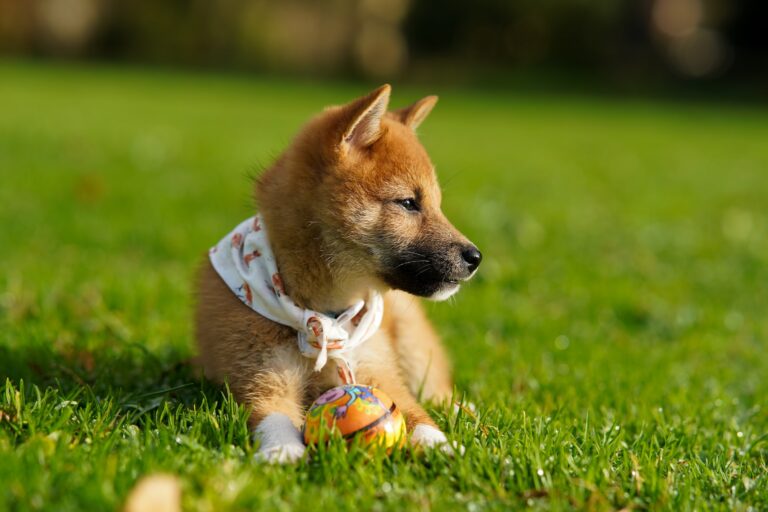Introduction
Shiba Inu puppies are more than just irresistibly cute companions; they are a unique breed with a fascinating history and a genetic makeup that defines their distinctive traits. In this comprehensive article, we will delve into the roots of Shiba Inu genetics, exploring the historical background, inheritance patterns, physical features, behavioral traits, common health concerns, and the crucial role of responsible breeding practices.
Historical Background of Shiba Inu
Originating in Japan, the Shiba Inu boasts a rich history that dates back centuries. Initially bred for hunting purposes, these small and agile dogs were carefully selected for their intelligence, independence, and adaptability. Preserving the historical characteristics of the breed is not just a matter of tradition; it’s a commitment to maintaining the essence of a breed deeply rooted in Japanese history.
Genetic Makeup of Shiba Inu Puppies
The genetic composition of Shiba puppies plays a pivotal role in shaping their physical appearance, temperament, and overall health. Selective breeding practices, guided by a deep understanding of genetics, aim to maintain the breed’s unique qualities while addressing potential health concerns associated with specific genetic markers.
Inheritance Patterns
Understanding how genes are passed down from one generation of Shiba Inu puppies to the next is essential for breeders and enthusiasts alike. We’ll explore the fascinating world of genetic inheritance, discussing common traits observed in the breed and the intricacies of passing down these traits from parent to offspring.
Distinctive Physical Features
Shiba Inu puppies are renowned for their distinct physical features, from their plush double coat to their curled tails. These characteristics are not arbitrary; they are a result of specific genetic factors. We’ll take a closer look at how genes influence coat color, size, markings, and other physical attributes that make Shiba Inu puppies stand out.
Behavioral Traits
Beyond their charming appearance, the behavioral traits of Shiba Inu puppies are also influenced by genetics. We’ll delve into the fascinating world of hereditary factors that contribute to their unique temperament, independence, and loyalty. Understanding these traits is crucial for prospective owners to create a harmonious relationship with their Shiba Inu companions.
Common Health Concerns
Like all breeds, Shiba Inu puppies may have genetic predispositions to certain health issues. Responsible breeding practices involve identifying and addressing these concerns to ensure the well-being of the breed. We’ll explore the common health concerns associated with Shiba puppies genetics and how breeders work to minimize these risks.
Selective Breeding Practices
Maintaining genetic diversity is crucial for the long-term health and sustainability of the Shiba Inu breed. We’ll explore responsible breeding practices, emphasizing the importance of avoiding inbreeding and promoting genetic variety. By doing so, breeders contribute to a healthier and more resilient population of Shiba Inu dogs.
Genetic Testing in Shiba Inu Breeding
Advancements in genetic testing have revolutionized the way breeders approach Shiba Inu breeding. We’ll discuss the role of genetic testing in identifying potential health issues, ensuring the health and vitality of Shiba Inu puppies, and making informed breeding decisions.
Breeding Ethics and Standards
Ethical considerations in Shiba Inu breeding extend beyond genetic factors. Adhering to breed standards and guidelines is essential for promoting responsible breeding practices and maintaining the integrity of the breed. We’ll explore the ethical considerations that breeders prioritize to ensure the well-being of Shiba Inu puppies.
Shiba Inu Popularity and Genetic Diversity
With their rise in popularity, Shiba Inu puppies have garnered widespread admiration. However, popularity can pose challenges to genetic diversity. We’ll examine the impact of popularity on genetic diversity and discuss the crucial role of breed enthusiasts in preserving the genetic health of the Shiba Inu breed.
Educating Shiba Inu Owners
Arming Shiba Inu owners with knowledge about genetic considerations is crucial for responsible pet ownership. We’ll provide insights into how owners can make informed decisions based on genetics, ensuring the overall well-being of their furry companions. From understanding health risks to appreciating behavioral traits, educated owners contribute to a happier and healthier Shiba Inu community.
Future Trends in Shiba Inu Breeding
As technology advances, so do opportunities for enhancing breeding practices. We’ll discuss potential future trends in Shiba Inu breeding, from the integration of genetic advancements to the use of innovative technologies for genetic improvement. The future holds exciting possibilities for further refining the breed while prioritizing its genetic health.
Conclusion
In conclusion, understanding the genetics of Shiba Inu puppies is not only fascinating but also paramount for ensuring the health, vitality, and preservation of this beloved breed. Responsible breeding practices, informed decision-making by owners, and ongoing advancements in genetic research contribute to a brighter future for Shiba Inu enthusiasts and their cherished companions.
FAQs
- Q. What are the key genetic factors in Shiba Inu puppies?
A. Shiba Inu puppies inherit key genetic factors that influence their physical appearance, temperament, and health. These factors include coat color genes, size-related genes, and markers for behavioral traits.
- Q. How can I ensure the health of my Shiba Inu through breeding?
A. To promote the health of Shiba Inu puppies, breeders should prioritize genetic diversity, conduct thorough genetic testing, and adhere to ethical breeding practices. Regular veterinary check-ups are also essential.
- Q. Are there specific behavioral traits linked to Shiba Inu genetics?
A. Yes, Shiba Inu behavior is influenced by genetics. Their independent and spirited nature, as well as their loyalty, can be attributed to specific genetic markers passed down through generations.
- Q. Why is genetic diversity crucial for the Shiba Inu breed?
A. Genetic diversity is essential for maintaining a healthy and resilient Shiba Inu population. It helps mitigate the risk of inherited health issues and ensures a diverse gene pool for future generations.
- Q. How can prospective Shiba Inu owners make informed decisions based on genetics?
A. Prospective Shiba Inu owners should research the breed’s genetic traits, choose reputable breeders who prioritize health and diversity, and ask for genetic testing information before acquiring a puppy.

